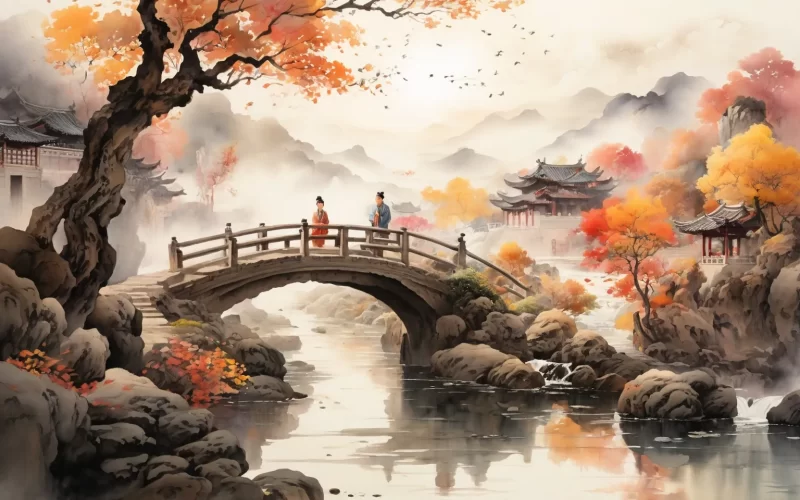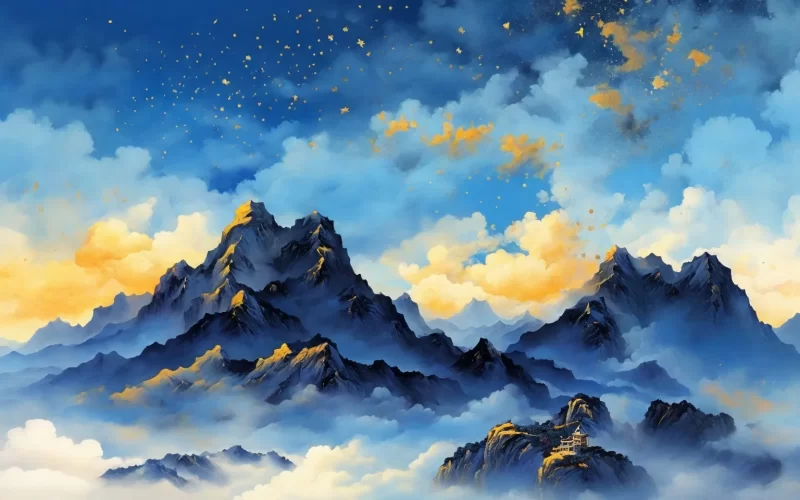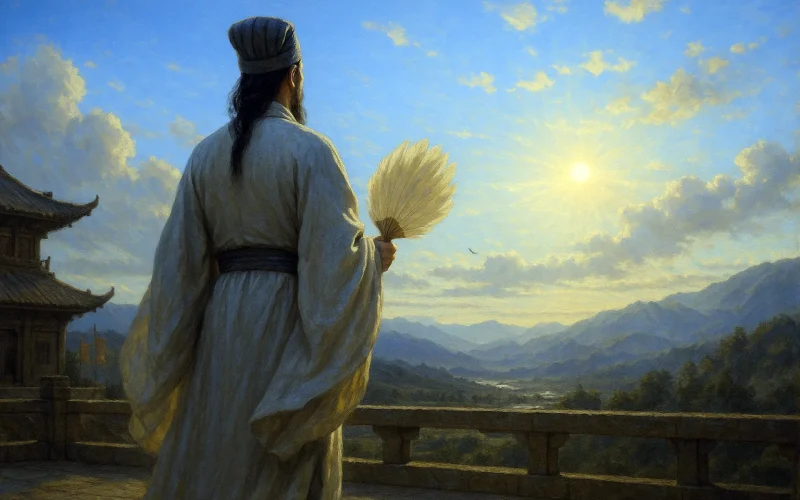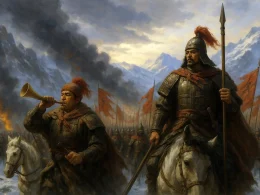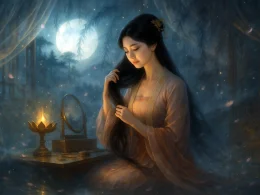Ten thousand ranges and valleys approach the Jing Gate
And the village in which the Lady of Light was born and bred.
She went out from the purple palace into the desertland;
She has now become a green grave in the yellow dusk.
Her face ! Can you picture a wind of the spring?
Her spirit by moonlight returns with a tinkling
Song of the Tartars on her jade guitar,
Telling her eternal sorrow.
Original Poem:
「咏怀古迹 · 其三」
杜甫
群山万壑赴荆门, 生长明妃尚有村。
一去紫台连朔漠, 独留青冢向黄昏。
画图省识春风面, 环佩空归月下魂。
千载琵琶作胡语, 分明怨恨曲中论。
Interpretation:
"Thoughts of Old Time III" is a seven-character regulated verse composed by Du Fu in the autumn of 766 AD during the reign of Emperor Daizong of the Tang Dynasty. At the time, Du Fu was living in Kuizhou (present-day Fengjie, Chongqing), aged, ill, and displaced, his career in ruins amidst national turmoil and widespread suffering. Gazing into the distance, the poet's thoughts were stirred by the sight of Zhaojun Village near Zigui, the birthplace of Wang Zhaojun, a Han dynasty court lady sent to marry a Xiongnu chieftain. Through Zhaojun's tragic story, Du Fu expressed his own sorrow over unrecognized talent and a life of wandering.
First Couplet: "群山万壑赴荆门,生长明妃尚有村。"
Qiún shān wàn hè fù Jīngmén, shēng zhǎng Míngfēi shàng yǒu cūn.
Countless mountains and valleys converge toward Jingmen; amidst them lies the village where the Bright Consort was born.
The couplet opens with a majestic depiction of the landscape, where mountains and valleys seem to surge toward Jingmen Mountain. This grand imagery sets the stage for Zhaojun's extraordinary fate and the secluded nature of her birthplace. The mountains' imposing presence hints at the weight of her destiny and the uniqueness of her story.
Second Couplet: "一去紫台连朔漠,独留青冢向黄昏。"
Yī qù zǐ tái lián shuò mò, dú liú qīng zhǒng xiàng huánghūn.
She left the imperial palace for the northern deserts, leaving behind only a lonely grave facing the dusk.
This couplet narrates Zhaojun's tragic life. The "purple terrace" (紫台) symbolizes the Han palace, from which she departed to marry a Xiongnu chieftain, only to die in a foreign land. Her "green grave" (青冢), standing solitary in the desolate twilight, serves as both a physical and emotional symbol of her sorrow and the futility of her fate.
Third Couplet: "画图省识春风面,环珮空归月夜魂。"
Huà tú shěng shí chūnfēng miàn, huán pèi kōng guī yuè yè hún.
The emperor knew her beauty only through a painted portrait; her soul now wanders home under the moonlight, adorned with jade.
Here, Du Fu critiques the Han emperor's reliance on a painted portrait to judge Zhaojun's beauty, which led to her tragic fate. The second line imagines her soul returning home under the moonlight, still adorned with the jade ornaments of her former life. This imagery underscores her loyalty to her homeland and the injustice of her exile.
Fourth Couplet: "千载琵琶作胡语,分明怨恨曲中论。"
Qiān zǎi pípá zuò hú yǔ, fēnmíng yuànhèn qǔ zhōng lùn.
For a thousand years, the pipa has played in the Xiongnu tongue, its melodies clearly voicing her enduring resentment.
The poem concludes with the haunting sound of the pipa, a traditional Chinese lute, playing in the Xiongnu style. The melancholic music symbolizes Zhaojun's unending sorrow and resentment, echoing through the ages. This final image leaves a lasting impression of her tragic legacy.
Overall Appreciation
The poem revolves around the tragic fate of Wang Zhaojun, using her story to express Du Fu's own feelings of unrecognized talent and displacement. Through vivid natural imagery and historical narrative, Du Fu intertwines Zhaojun's sorrow with his own, creating a poignant reflection on fate, injustice, and the passage of time. The poem's tone is somber and introspective, evoking deep empathy for both Zhaojun and the poet himself.
Writing Characteristics
- Symbolism and Emotional Depth
Du Fu uses Zhaojun's tragedy as a metaphor for his own struggles, layering personal and historical sorrow to create a profound emotional impact. - Integration of Scene and Emotion
The poem blends natural landscapes with emotional reflection, using the grandeur of the mountains and the desolation of the grave to mirror the poet's inner turmoil. - Structured Progression
The poem moves from geographical description to historical narrative, culminating in the haunting sound of the pipa. This structure creates a seamless transition from the physical to the metaphysical. - Subtle Use of Allusion
References to the "purple terrace," "green grave," and "Xiongnu tongue" enrich the poem's historical and cultural context, deepening its emotional resonance.
Insights
This poem reflects Du Fu's profound contemplation of historical tragedies and personal misfortune. Zhaojun's story, marked by the emperor's negligence and her own helplessness, mirrors the plight of individuals caught in the machinations of power. Du Fu's identification with Zhaojun underscores the timeless struggle of unrecognized talent and the sorrow of displacement. The poem serves as a reminder of the lessons history holds and the importance of recognizing and addressing injustice to prevent its recurrence.
Poem translator:
Kiang Kanghu
About the poet

Du Fu (杜甫), 712 - 770 AD, was a great poet of the Tang Dynasty, known as the "Sage of Poetry". Born into a declining bureaucratic family, Du Fu had a rough life, and his turbulent and dislocated life made him keenly aware of the plight of the masses. Therefore, his poems were always closely related to the current affairs, reflecting the social life of that era in a more comprehensive way, with profound thoughts and a broad realm. In his poetic art, he was able to combine many styles, forming a unique style of "profound and thick", and becoming a great realist poet in the history of China.






